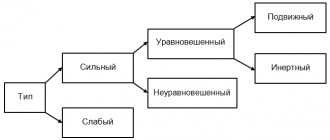A person’s temperament is a specific set of his distinctive qualities, which are characterized by the characteristics of behavior, mental processes, as well as their strength, speed, cessation, change and occurrence.
The property of temperament is a very conditional indicator. Rather, he speaks of purely individual characteristics that arose from congenital and acquired traits.
In psychology there are no specifically accepted definitions of temperament types, however, according to the ancient theory of Hippocrates and Galen, there is a conditional division into four types
Definition of the concept
Called temperamentum in Latin, it is a combination of individual characteristics that characterize the sensory (affective) and dynamic spheres of his higher nervous activity (that is, comprehension, emotional reactions and behavior). This is a certain psychological foundation on the basis of which an individual develops and which determines a number of social properties of the psyche that contribute to the adaptation of people in society.
Historical reference
There was talk about temperament back in the 5th century BC. But only in the 18th century this issue was approached from a psychological point of view, having identified a number of stable qualities that are given to an individual by nature and directly affect his mental activity.
Teachings of Hippocrates
The founder of ideas about the innate characteristics of a person is considered to be this ancient Greek thinker and healer, who divided people into four substances predominant in the body: black and yellow bile, phlegm (mucus), blood. His follower was Claudius Galen, who listed the main types of temperament based on physiological differences.
Other concepts in the diagram
Over time, many researchers arose who devoted their work to the study of temperament.
Our days
There are 3 fields of psychophysical activity that are influenced by a person’s innate character traits:
- The level of overall intensity of interaction between the individual and the world. It can manifest itself in lethargy and passivity, excessive energy, or occupy an intermediate position between these extremes.
- Mobility. It is expressed in the speed and sharpness of movements and phrases. Accordingly, in this path people are divided into fast and slow.
- Emotionality. It is related to how often an individual’s emotional state changes, how susceptible and vulnerable he is.
Depends on temperamental characteristics
- The pace of work and the rhythm of life.
- The power of emotions, will, the ability to take control of psychological processes.
- Speed of perception, concentration, thinking.
- Discipline and self-discipline.
- Extroversion and introversion.
Doesn't belong to temperament type
- Character. It can change as we grow older, socially interact, and develop habits.
- Capabilities. This concept refers to how deeply, quickly and easily an individual masters new skills and knowledge and is not subject to natural behavioral characteristics.
Individual traits that are not subject to change are the basis for the development of human qualities and attitudes. These are peculiar superstructures that determine the methods of communication and behavior of an individual, but do not in any way affect whether a child grows up capable or not. However, knowing what traits predominate in this mental foundation of the baby, you can choose the most effective methods for his upbringing. As an adult, understanding which group you belong to will give you the opportunity to find effective tools and mechanisms for working on yourself.
Choleric
He is a fairly strong-willed person with a strong character. He is not afraid of difficulties and is ready to take on difficult tasks. He is confident in his abilities, therefore he is able to adapt in difficult situations, protect himself and the weak. They make excellent speakers and leaders. Inner strength and the ability to persuade help them successfully lead a large group of people.
The choleric person is quite jealous, so in his personal life he treats his partner as property. He easily falls in love and becomes attached to a person. In family life he initiates scandals.
It is difficult to restrain emotions, so you should expect straightforward statements from a choleric person. Nevertheless, he has no equal in oratory skills - he is able not only to speak beautifully, but also to convince, winning in an argument.
Choleric children are distinguished by their capriciousness. They try to attract the attention of all family members. In adolescence they become hyperactive, changing tastes and hobbies quite often.
Minuses:
- incontinence;
- impulsiveness;
- haste;
- straightforwardness;
- harshness towards the actions of others;
- periodic aggression.
Advice
:
It is recommended that representatives of this type of temperament work on their emotions. In order not to rush headlong into the pool and do something stupid, you should use the ten-second technique. It lies in the fact that before taking a decisive step, you need to count to ten in your head and then act. Usually, the ardor and intensity of passions disappear, allowing you to make a more informed decision.
Types of human temperament and their characteristics: comparative table of types
| Name | External signs | Features of speech | Specifics of communication |
| Choleric | Moving eyes, lips form a straight line, the gaze covers the entire space in which it is located. | Quick response to a question asked, as well as the overall pace of response. | In a conversation with several interlocutors, he strives to maintain eye contact with everyone and makes decisions hastily. |
| Sanguine | The corners of the mouth are raised upward, the angle of vision is wide. | Often switches from one topic to another, speaks fluently. | He tries to keep his gaze on each participant in the polylogue. |
| Phlegmatic | Looks as if deep into himself, the lip line is smooth and straight. | Slow, long pauses in conversation. | The gaze is directed only at the one to whom the phlegmatic person is directly addressing. |
| Melancholic | He looks more inward than at those around him, the corners of his lips are downturned. | The pace is average, there is uncertainty in the voice. | Maintains eye contact only with the person with whom he is currently speaking. |
Psychologist Daria Milai
Make an appointment
Properties of temperament in psychology
- Extroversion/introversion. These concepts determine the dependence of the individual more on manifestations of the external world (extroverts) or on intrapersonal processes (introverts). The first include sanguine and choleric people, and the second - phlegmatic and melancholic.
- Speed of response. It includes the manner of speech, the speed of thinking, the intensity of gestures and facial expressions, and emotionality. It is clearly expressed in sanguine, choleric and melancholic types.
- Reactivity. In simple words - the degree of a person’s involuntary reaction to certain stimuli: criticism, harsh tone. People with an extroverted temperament have a strong and automated defense mechanism.
- Activity. Determined by the amount of energy resources of the body. It shows how a person overcomes life’s difficulties, how purposeful he is. In this understanding, phlegmatic people have the highest energy - they can maintain focus on one activity for a long time, do not overwork, but are slow to get involved in the process.
- Plastic. This is an indicator of how well an individual adapts to the outside world. Sanguine people are distinguished by highly developed adaptability.
- Emotional excitability. It depends on the minimum threshold of influence, which is sufficient for the appearance of emotion. It is elevated in everyone except phlegmatic individuals.
Psychological personality types
Types of human temperament are the most well-known classification of people according to types of behavior, but there are other points of view on personality. There are two psychological personality types - extrovert and introvert. What do these concepts mean?
Extroverts (sanguine, choleric) - the attention of these people is directed to the outside world, such individuals are often impulsive, proactive, show flexible behavior in relationships with people, life circumstances, are sociable, easily find contact with new people, and easily adapt to society.
Introverts (melancholic, phlegmatic) are opposite in personality type, their attention is focused on the inner world and their feelings and thoughts. Such people are uncommunicative, difficult to make contact, often withdraw into themselves, are not socially active, like to engage in introspection, and have a more difficult time adapting to society.
It is possible to determine which personality type is observed in each person by observing behavior or by passing special tests. Usually shy, reserved and uncommunicative are introverts, while the soul of the company and the ringleaders are extroverts. It is important to understand that this is a feature of the psyche - not everyone likes noisy companies, some are comfortable alone, treat loved ones and friends with understanding, everyone has their own preferences and perception of life, look for compromise ways to spend time and communicate.
There is another classification that determines the types of human temperament
- Active - people with this temperament are usually well developed physically, they can be athletes or simply fit, with a good figure. Facial features may be harsh. Such people are dexterous, have high willpower, brave, daring, independent, and are attentive to any work or responsibilities. Responsibility and energy may decrease with insufficient spiritual development.
- Vital temperament - this type of people is characterized by even greater muscles, while they are good-natured, open, generous, and merciful. In this case, the will is less developed and there is a lack of firmness in decision making. It is necessary to develop perseverance, determination, and independence.
- Spiritual temperament - people with this temperament are poorly developed physically and may have a large skull and a high, wide forehead. Facial features are usually quite expressive. Endurance and willpower are largely determined by the development of the brain, awareness of goals and aspirations, and can also achieve high results (science, art). At the same time, they quickly succumb to fatigue.
These three types of temperament are rarely found in their pure form, but the physical condition of a person is decisive; additional factors are also of great importance, especially spiritual awareness and the presence of willpower.
The temperaments of human activity are inextricably interconnected, different jobs require special properties - the ability to react quickly, communicate with people, perseverance and perseverance, responsibility, therefore, when choosing a job, it is worth thinking about what will be easier, more calmly tolerated by the body, perceived by the human psyche?
Melancholic and phlegmatic people love quiet work that is not associated with high stress and anxiety, for example, document management. Cholerics and sanguine people prefer active work on the front line - management, sales, personal communication with clients. In families, it is believed that people with opposite temperaments go well together.
Teachings of Pavlov I.P.
In fact, people who can clearly identify one specific type of temperament are rare. In most cases, we should talk about the predominant features inherent in one or another option, which are complemented by others in different proportions. For example, you may more often express yourself as a phlegmatic person, a little less often as a melancholic person, even less often as a choleric person, and in exceptional cases as a sanguine person.
Criteria for determining temperament
- The relationship between the processes of excitation and inhibition.
- Metabolic speed.
- The power of emotions.
- Features of physiological structure.
Based on 3 components
The research of the Russian scientist explains the manifestation of certain traits from a physiological point of view: in each representative a certain type of higher nervous activity (HNA) prevails, which indicates the existence of a predominant temperament.
Process characteristics
- Strength (S)/weakness (DC). Shows how long an individual is able to maintain performance under prolonged loads and stress resistance.
- Balance (U)/imbalance (N). How easily a person can remain calm in an emotionally provoking environment and control himself.
- Mobility (P)/inertness (I). The influence of inhibition and excitation, the predominance of one over the other.
Correlation of nervous system types
- Choleric - S-N-P.
- Sanguine - S-U-P.
- Phlegmatic - S-U-I.
- Melancholic - Sl-N-I.
Sanguine
These are cheerful and active individuals. They rarely lose heart and try to find a way out of any situation. People are drawn to them because they are also great speakers. Their speech is quite competent, voluminous and interesting. Unlike choleric people, they do not manifest themselves as dictators, but they can start and lead a crowd.
Sanguine people are very active. They find it difficult to sit in one place. Their daily routine is quite busy. People tend to travel and change their place of residence. Please note that among sanguine people there are quite a few actors and artists. They know how to make people fall in love with themselves, demonstrating their love for life and everything new.
The degree of excitation of the nervous system is high, and the threshold of inhibition is low. This means that a person perceives the world through the prism of some of his illusions. But it cannot be said that a sanguine person is constantly in the clouds. Yes, he can remember ridiculous events, but forget significant dates, such as the birthday of loved ones, for example.
Sanguine people are able to please. They show their emotions, are not afraid to cry, sympathize, and laugh. Their sincerity is not feigned. These people want to be open, but they also want to be treated the same way. It is easy to recognize a sanguine person in a crowd. He will be among a large number of people who listen to him carefully. When talking, a sanguine person gesticulates a lot, which is another feature for recognition. They are distinguished by extraordinary thinking. These people are always learning something, trying to learn new things, changing their haircuts, image, and the interior of their apartment.
Sanguine people are good friends. They do not abandon a person in trouble, and always rush to provide all possible assistance. In their personal lives they turn out to be flighty personalities. Their sociability prevents them from building a harmonious union. Not all partners understand the need of sanguine people to communicate with other people.
Flaws:
- gets down to business, but rarely completes it;
- does not like monotony;
- often overestimate their capabilities.
Advice
:
Sanguine people should work on developing willpower, learn discipline and rely only on their own strength.










